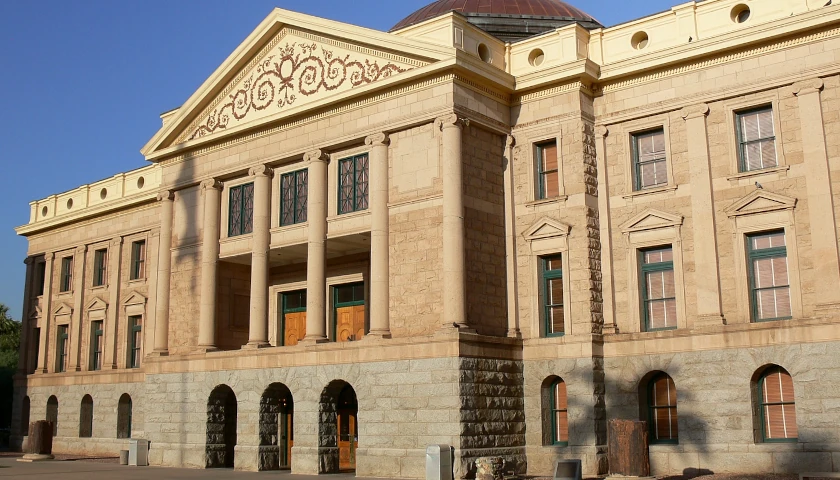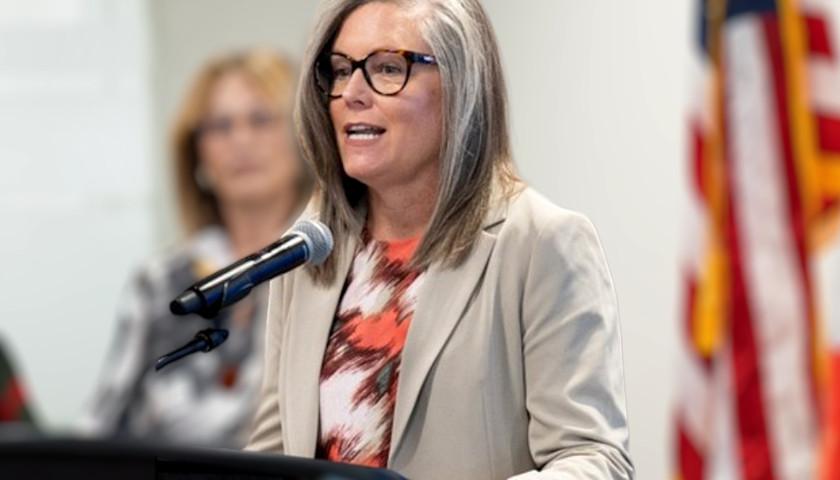Late Saturday night, lawmakers signed a controversial budget deal, which is now on its way to Governor Katie Hobbs where she is anticipated to sign it. Hobbs, House Speaker Ben Toma (R-Glendale), and Senate President Warren Peterson (R-LD12) negotiated this bipartisan agreement, excluding both Democratic leadership and Freedom Caucus members from the negotiation table.
Republican leadership praised the Arizona Fiscal Year 2025 state budget for its conservative fiscal discipline, addressing a $1.4 billion shortfall without raising taxes, and prioritizing public safety and school choice.
The conservative Freedom Caucus strongly opposed the budget, citing concerns about both the process and the substance. Democrats also criticized the budget, accusing Republicans of “buying Democratic votes.”
Senator Anthony Kern (R-Glendale) expressed his support for the Freedom Caucus members, describing them as “watchmen standing on the wall.” He stated that despite pressure from the establishment to “come down,” “quit fighting,” or accept potential electoral losses, true warriors “never give up, never give in, and never surrender.” Kern emphasized his honor in fighting alongside these dedicated individuals.
Meanwhile, Attorney General Kris Mayes issued a lengthy statement articulating her opposition to using $1.14 billion in opioid settlement funds to cover Arizona’s budget deficits. These funds are part of a national settlement intended to address the impact of the opioid crisis, which includes support for opioid education, rehabilitation resources, harm reduction strategies, and other public health initiatives. Mayes warned that diverting these funds to cover budget shortfalls could jeopardize the settlement’s primary objectives and undermine efforts to combat the opioid epidemic in Arizona. She has threatened legal action to block any attempt to repurpose these funds for budgetary purposes, emphasizing the need to honor the original intent of the settlement to support communities affected by the opioid crisis
Hobbs is poised to sign the budget and stated, “Arizonans can rest assured that their state has a balanced budget. I’m thankful for members of the legislature who came together, compromised, and passed this bipartisan agreement. By working together, we made responsible choices that protected critical services that everyday Arizonans rely on while closing a $1.8 billion deficit.”
Fiscal Responsibility
“Following last year’s state budget, where Republican lawmakers provided inflationary relief to everyday Arizonans through $274 million in tax rebates to struggling families, and a ban on the tenant-paid rental tax taking effect this January, Republicans are again successfully supporting our hardworking citizens while simultaneously reining in spending,” stated Senate President Warren Petersen in a late Saturday night statement.
🚨FOR IMMEDIATE RELEASE: Republicans Eliminate Deficit, Increase Border Security Spending, Fully Fund Public Safety, Protect School Choice, Shrink Government in 2024-2025 State Budget
FULL STATEMENT: https://t.co/ZrLJXQFbUc pic.twitter.com/YIz2iiK1FM
— AZSenateRepublicans (@AZSenateGOP) June 16, 2024
Speaker of the House Ben Toma echoed similar statements in his own late-night news release: “At a time when Arizonans are having to tighten their financial belts, so is state government. The Arizona House of Representatives has passed a fiscally conservative, structurally balanced state budget that solves the nearly $1.5 billion deficit, without touching the rainy-day fund or using budget gimmickry. The budget trims government and protects conservative priorities.”
✅House Approves Fiscally Conservative State Budget that Trims Government and Protects School Choice
“At a time when Arizonans are having to tighten their financial belts, so is state government. The Arizona House of Representatives has passed a fiscally conservative,… pic.twitter.com/yJRtoKAZqb
— Arizona House Republicans (@AZHouseGOP) June 16, 2024
The conservative Freedom Caucus took exception to the budget, slamming the process, and many members voted no on most of the bills. Lawmakers on the floor and on social media expressed strong reservations about voting for a budget they haven’t had a chance to thoroughly read or vet. “This is not good governance,” Representative Barbara Parker (R-Mesa) said on the House floor, highlighting the procedural issues at hand. Parker criticized the process as a “good boys network.”
Speaker Pro Tempore Travis Grantham (R-Scottsdale) told the body that “this is not a bad budget” but rather a product of “divided government.”
It’s a perfect example of the Swamp that establishment Republicans at the Arizona Capital are saying “the Freedom Caucus is the problem” on this budget 🤡
The reality is that this is what happens when weak Republicans negotiate a budget in secret with Democrats.
The result is…
— Arizona Freedom Caucus (@AZFreedomCaucus) June 15, 2024
Enhanced Border Security and Commitment to Second Amendment
Republican leaders highlight the budget’s commitment to enhancing border security, allocating $5 million for local border security support and $4 million for fentanyl and law enforcement response. “Our budget also reflects our support for our citizens’ Second Amendment rights,” said Senator David Gowan (R-LD19).
The Freedom Caucus, however, disagreed and cited a “failure to appropriate any new meaningful border security money for local Sheriffs.”
“I feel like this year’s budget seems more focused on getting it done than doing it right,” Rep. Matt Gress (R-Phoenix) said when voting no on the budget Saturday night. In a post, he said, “I think many of us feel like this does not reflect the shared priorities of Arizonans. I believe this budget is a fiscal tragedy both in terms of process and policy.”
Support for Education and School Choice
Toma declared in his news release, “I’m most proud of the fact that this budget fully protects the state’s universal Empowerment Scholarship Account (ESA) program, which provides educational freedom for Arizona families. Democrats have long vowed to dismantle the program. As the sponsor of the universal expansion of ESAs, I was never going to let that happen. Eligibility for the program is unchanged, and we have included several smart, commonsense reforms that improve this popular school choice program and increase accountability.”
Majority Whip Sine Kerr on the Senate floor said, “We are continuing our commitment to providing every family in the state of Arizona with a quality education, no matter their zip code or economic status.”
Save Our Schools Arizona criticized the budget, claiming “universal vouchers caused a full half of the budget deficit, yet this budget does nothing to rein in the runaway program,” and described the ESA program as a “coupon for the rich.” Rep. Annalise Ortiz (D-LD24) said, “we are trying to balance the budget on the backs of children of color in lower-income communities.”
Conservative activists refute claims that ESAs are responsible for “half the budget deficit” and emphasize that ESA scholarships are not vouchers. Jenny Clark, a conservative activist with I Heart My School, said, “Budgets for K-12 education adjust throughout the year. This fall, ESA enrollment exceeded projections, but the increase is only 0.12% of Arizona’s total $17.88 billion budget, so it’s not particularly concerning. The K-12 education budget stands at $7.7 billion. Public schools spend $15,000 per student, whereas ESA spends $7,500 per student.”
In his press release, Toma highlighted the common sense improvements as:
- Requiring the Department of Education (ADE) to utilize risk-based auditing of the program.
- Parents will retain their ability to be reimbursed for approved expenses.
- Parents will be able to plan for the next school year by applying early.
- Implements fingerprinting requirements for private educators, matching current STO law.
However, the Freedom Caucus claimed in their statement that the changes to the ESAs will kneecap the school choice tax credit, serve to regulate private faith-based schools, weaponize public schools’ ability to stop conservative teachers from providing instruction to ESA students, and impede parental authority.
Governor Hobbs stated, “While this bipartisan budget delivers reforms to the ESA program, they are not enough.” She renewed her interest in targeting the program, “I stand committed to bringing much-needed accountability and transparency to the unsustainable ESA program that significantly contributes to the state’s budget deficit.”
No New Taxes but Programs Were Cut
Republicans boasted in their press release, “One of the hallmark achievements of this budget is the steadfast commitment to no new taxes or tax increases.”
The Freedom Caucus criticized the budget, stating, “The reality is that this is what happens when weak Republicans negotiate a budget in secret with Democrats.” The Caucus argued that the budget allocates excessive funds to the healthcare industrial complex and uses budget gimmicks to pretend to solve the deficit.
Arizona’s colleges and universities will receive budget cuts. Community colleges will see a $54 million decrease, and some programs will be eliminated starting in 2026, according to Lauren Armour, Director of Government Relations for Maricopa Community College.
The budget eliminates the entire $430 million budget allocated to the Water and Infrastructure Finance Authority enacted to protect our future water.
Nearly all state agencies will take a lump-sum cut, most of them 3.45 percent, though public safety agencies, including the state police and prisons, were not included in this cut.
– – –
Christy Kelly is a reporter at The Arizona Sun Times and The Star News Network. Follow Christy on Twitter / X. Email tips to [email protected].





